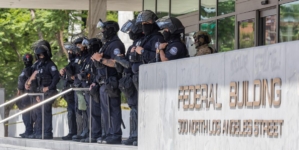-
Martin Brundle Warns Mercedes F1 of Kimi Antonelli ‘Crisis’ - 20 mins ago
-
Messi’s New Bodyguard? Argentina’s Rodrigo De Paul Joins Inter Miami - 34 mins ago
-
Yankees’ Aaron Judge Finally Breaks Silence Following Grim Injury Update - 59 mins ago
-
2025 NASCAR Odds: Kyle Larson, William Byron Favorites For Brickyard 400 - about 1 hour ago
-
Dodgers Could Reunite With Closer Kenley Jansen in Deadline Homecoming - 2 hours ago
-
Liverpool to Create Permanent Memorial Sculpture at Anfield to Honor Diogo Jota - 2 hours ago
-
Elderly Americans Lose $745M to Scams in 2025 So Far - 2 hours ago
-
2025 MLB Hall of Fame Primer: Ichiro Suzuki, CC Sabathia, Dave Parker, More - 3 hours ago
-
At Least 11 People Injured in Stabbing at Michigan Walmart - 3 hours ago
-
Phillies vs. Yankees Highlights | MLB on FOX - 3 hours ago
ICE raid at major pot operation clouds picture for legal cannabis in California
Camarillo — Ever since federal immigration agents raided one of the largest licensed cannabis operators in the state this month, the phones of cannabis industry insiders have been blazing with messages of fear, sadness and confusion.
“It sent shock waves through the community,” said Hirsh Jain, the founder of Ananda Strategy, which advises cannabis businesses. “Everyone is on text threads.”
Glass House Brands, whose cannabis operations have helped make Santa Barbara and Ventura counties the new cannabis capitals of California, has long been among the most prominent companies in the state’s wild frontier of legal cannabis. Some call it the “Walmart of Weed” for its streamlined, low-cost production methods, its gargantuan market share and its phalanx of wealthy investors and powerful lobbyists.
But federal immigration agents stormed onto company property in Camarillo and Carpinteria on July 10 in a cloud of tear gas, as if they were busting a criminal enterprise. Agents in masks and riot gear marched for hours through the company’s vast greenhouses as workers fled and hid in panic. One worker, Jaime Alanís Garcia, died after he fell three stories while trying to evade capture.
For Glass House, the aftermath has been devastating. Its stock, which is traded on the Canadian stock exchange, dropped from more than $7.75 a share the day before the raid to $5.27 on Thursday. Some workers disappeared into Immigration and Customs Enforcement detention or bolted, too fearful to return. Others were so traumatized that Glass House brought in grief counselors, according to a source close to the company.
Glass House Brands has long been a prominent company in California’s wild frontier of legal cannabis.
(Myung J. Chun / Los Angeles Times)
Across the wider world of legal California cannabis — where many growers and entrepreneurs have hoped the Trump administration would legalize the drug — people were also shaken. Did the action against Glass House signal an end to federal law enforcement’s ceasefire against legal cannabis in California and dozens of other states?
And what did it mean for Glass House itself, among the largest cannabis companies in the world? How could this slick corporate entity, founded by an ex-cop and special education teacher and a former tech entrepreneur, be in a position in which federal agents claimed to have apprehended more than a dozen undocumented minors on site?
“This could not come at a worse time,” said Jain, the cannabis consultant, adding that the images and rhetoric that have whipped across social media in the wake of the raid “impedes our ability to legitimize this industry in the eyes of California and the American public.”
He added that “a failure to legitimize a legal cannabis industry enables the proliferation of an illicit industry that is not accountable and engages in far more nefarious practices.”
Working conditions in the cannabis industry are notoriously grim, as documented in a 2022 Times investigation that revealed workers who had their wages stolen, were forced to live in squalid and dangerous conditions and sometimes even died on the job.
Glass House had no such reports of injuries or deaths before the raid and has long touted its working conditions. A source close to the company said it pays workers more than minimum wage, and internet job postings reflect that.
Still, as with almost all farmwork in California, some of those who labored there were undocumented. The company employs some people directly and relies on farm labor contractors to supply the rest of its workforce. A source close to the company said labor contractors certify that the workers satisfy all laws and regulations, including being 21 or older as required to work in cannabis in California.
In the days after the raid, federal officials announced they had detained 361 people, including 14 minors, who by California law cannot work in cannabis. It wasn’t clear how many of those detained were undocumented or how many were even working at the operation or were just nearby. At least two American citizens were caught up in the dragnet — a security guard headed to work at Glass House and a philosophy professor at Cal State Channel Islands who was protesting the raid.
Homeland Security Secretary Kristi Noem said this month that Glass House had been targeted because “we knew, specifically from casework we had built for weeks and weeks and weeks, that there was children there that could be trafficked, being exploited, that there was individuals there involved in criminal activity.”
Glass House officials declined to comment for this article, but in an earlier statement on X, the company said that it had never employed minors and that it followed all applicable employment laws. A source close to the company said the search warrant federal officials presented to Glass House the day of the raid alleged it was suspected of harboring and unlawfully employing undocumented immigrants — but did not mention child labor.
In the last few years, the company — along with labor contractors — was named in lawsuits by workers alleging they had been sexually harassed, suffered discrimination, and been shorted overtime pay and required meal and rest breaks.
One worker at Glass House — who asked not to be identified because he is undocumented and hid from immigration agents during the raid before escaping — said he was employed to work in Glass House’s cannabis operation through one of its labor contractors and valued the job because it is year round, not seasonal like many agricultural jobs.
But he complained that the contractor had repeatedly paid him late, forcing him to borrow money to make his rent. He also said supervisors put intense pressure on employees to work faster, screaming expletives at workers, refusing to allow breaks, or yelling at them to eat quickly and return to work before their rest periods were done.
A source close to the company said the complaints involved people employed by labor contractors, regarding actions by those contractors and not Glass House directly.
Many of the suits are pending, with Glass House named as a co-defendant. Company officials declined to comment publicly.
A source close to the company said Glass House takes seriously its responsibilities under California labor law and is committed to ensuring that all labor practices within its operations meet the highest standards.
The source added that the raid has shaken a company that has always tried to operate by the book and that, despite its exponential growth in recent years, has sought to maintain a close-knit feel.
“It’s very sad,” the source said.
In the wake of the raids at Glass House, the United Farm Workers union issued a bulletin in English and Spanish warning anyone who is not a U.S. citizen to “avoid working in the cannabis industry, even at state-licensed operations.” The union noted that “because cannabis remains criminalized under federal law, any contact with federal agencies could have serious consequences even for people with legal status.”
TODEC Legal Center, a Coachella Valley-based group that supports immigrants and farmworkers, issued a similar message. TODEC warned noncitizens to avoid working in the marijuana industry and avoid discussing any marijuana use or possession — even if it is legal in California — with federal agents, because it could hurt their status.

Federal agents conduct a raid of Glass House Brands on Laguna Road in Camarillo.
(Julie Leopo / For The Times)
About half the farmworkers in California are undocumented, according to UC Merced researchers. Cannabis industry experts said it is too soon to know whether the raid on Glass House will affect the larger cannabis workforce — or whether more licensed cannabis operations will be raided.
“My best guest would be that this is going to be happening to a lot more cultivation farms,” said Meilad Rafiei, chief executive of the cannabis consulting group We Cann.
Among the undocumented workers at Glass House on the day of the raids was Alanís, 56, who had been a farmworker in California for three decades. Over the last 10 years, Alanís worked in the Ventura area, first in a flower nursery and then, once Glass House converted the massive greenhouse complex there, in cannabis.
On Monday night, his family held an emotional wake for him in Oxnard, where he lived. The Camino del Sol Funeral Home was filled, as many family members held one another tightly and cried. They remembered him as a hardworking, joyful man, who danced at parties and enjoyed every meal he shared with family.
State Sen. Monique Limón (D-Goleta), who led the Senate in adjourning in Alanís’ memory last week, told the chamber how he had climbed onto the roof of a greenhouse to escape federal officers. From 30 feet up, she said, he called his family to tell them what was happening, and to report “how scared he was.”
“Jaime’s life was dedicated to our lands, our crops, and to providing for his family,” Limón said, adding that he “had had no criminal record, he was who our country and our state depended on to provide food on all of our tables.”
She added that “his last moments on Earth were filled with terror.”
Source link































